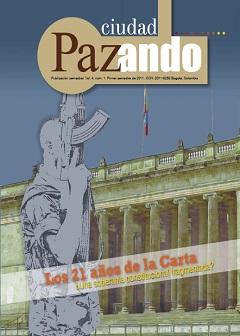DOI:
https://doi.org/10.14483/2422278X.7344Published:
2014-09-04Issue:
Vol. 4 No. 1 (2011): 21 years of the Charter. A fragmented constitutional sovereignty?Section:
Avances de investigaciónA propósito de los ambientes educativos y los territorios del miedo
Downloads
Abstract (es)
La investigación sobre Ambiente Educativo de Escuelas en Zonas de Conflicto Armado se está desarrollando en el departamento del Putumayo con un trabajo de campo orientado tanto a la observación como a la recolección de relatos de maestros, niños y miembros de la comunidad. Los ambientes educativos se instauran en las dinámicas que constituyen todos los procesos de la acción educativa, e involucran acciones experiencias y vivencias. Es allí, donde se gestan las actitudes, las condiciones materiales y socioafectivas que determinan los territorios y las relaciones necesarias para los propósitos culturales de reproducción. El abordaje del avance se hace considerando tres vías de aproximación: en primer lugar, el contexto histórico, económico y social; en segunda instancia las dinámicas culturales que se han ido configurando desde la sociabilidad y las prácticas de socialización; y por último, las afectaciones que en lo psicosocial ha generado la violencia –patrones de deshumanización en los términos de Martín Baró y Samayoa- y que inciden en la naturalización de los Territorios del Miedo.How to Cite
APA
ACM
ACS
ABNT
Chicago
Harvard
IEEE
MLA
Turabian
Vancouver
Download Citation
License
The Ciudad Paz-ando Journal (RCP) is an open access publication, without economic charges for authors or readers, whose biannual publications are made under the terms of the Creative Commons Attribution - Non-commercial - Share the same License (CC-BY-NC -SA 2.5 CO), with which others may distribute, remix, retouch, and create from the work in a non-commercial way, as long as they give credit and license their new creations under the same conditions.
The copyright holder is Ciudad Paz-ando journal, retaining all rights without restrictions, respecting the terms of the license regarding the consultation, download and distribution of the material.
When the work or any of its elements are in the public domain according to the applicable current law, this situation will not be affected by the license.
Likewise, we encourage authors to deposit their contributions in other institutional and thematic repositories, with the certainty that culture and knowledge is a good for all and for all.

